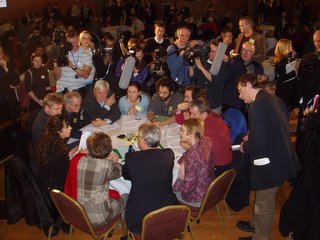 Methodist Central Hall in London was abuzz earlier today with campaigners appraising Members of Parliament and politicians busily counting future votes.
Methodist Central Hall in London was abuzz earlier today with campaigners appraising Members of Parliament and politicians busily counting future votes. "Carbon dating" was the idea of Stop Climate Chaos, a coalition of voluntary and campaign groups in Britain that together claim several million members. They pulled off the remarkable trick of getting up to seventy MPs, including some very senior ones, to sit down with them and discuss their demands to establish a carbon budget that cuts UK emissions every year and to keep climate change at the top of the international agenda.
The event was dressed up as a speed dating extravaganza in which the politicians went from table to table, wooing with equal fervour ladies from of a certain age from the Women's Institute and dreadlocked pierce-lipped international development workers.
David Cameron, the Conservative leader, exuded fitness. Surely his weirdly dilated pupils did not indicate the application of belladonna beforehand? More ambitious targets needed to be "based on sound science"…by which he meant they had to be technically feasible. His love drug was a second Kyoto-style treaty...with the health warning that nothing could be achieved without lots of new technology. A cross-party consensus and an independent climate commission were central Conservative aims (endorsed by virtually every party at Westminster except…Labour!). Only the most unsympathetic partner would accuse the Conservative Party leader of dishing out bromides at full strength.
Peter Ainsworth, Conservative spokesman on the environment, promised his consorts that his party would soon announce something "very interesting" about cars. Aviation was more of a challenge, but surely, he added, it was crazy that a flight to Malaga should cost only a tenth of what it cost to park at Gatwick airport. On the way out, I asked him what he thought of President Chirac's proposed tax on every airline ticket into France. This too was "a very interesting idea".
But on this correspondent's semi-random sampling of brief encounters around the hall, it was Liberal Democrats among Britain's three big political parties who would be receiving the most roses and chocolate. And, as Bagehot recently noted, it's quite possible the party could hold the balance of power in a hung parliament after the next election.
Norman Baker said that, unequivocally, there had to be a cap on airport expansion. He also suggested that every airline ticket should bear a mark showing how much carbon the passenger was responsible for.
The three candidates for the Lib Dem leadership worked the room in inverse proportion to their chances of success. Ming Campbell kept it short and sweet, while Simon Hughes courted dozens of tables.
Chris Huhne, all panda eyes and bushy fur, concentrated his fire and impressed his amours with a dig at the Labour government's record on green taxes. These had been steadily cut since 1999, he said. But taxing energy consumption was the best way to change behaviour at home and to give a signal internationally. Purrs around the table.
For Labour, Elliot Morley and a galaxy of other lovelies did their level best (an outside vote would go to former Environment Minister Michael Meacher; but he is now a largely solitary Romeo, having been cast into darkness for having spoken off message one too many times).
One concern, Morley said, was that a specific commitment to 3% year on year emission cuts could be unwise "because reality can be more spiky". His sharpest elbow for rival suitors on general calls for consensus. The question was what to actually do: "the detail is everything!" and here, he said, was the Conservative weak point. "They want to abolish the Climate Change Levy". Then he was off – to do important business at the Treasury that could make a difference on climate change, he told activists and Margaret Beckett who happened to be passing on her way to the encounter pictured above (she's the one in grey check with the red scarf and her back to the camera).
As the event drew to a close one could stand back and ask who is wooing who? One veteran journalist muttered "pathetically weak questions! When will the NGOs learn that politicians don't take them seriously?"
Both activists and politicians hope to engage the wider British public and other major players in society. Will these wider constituencies fall for their whiles? One thing that might help Stop Climate Chaos is a more accent on the positive (according to one insider, the name of the coalition, with its negative vibe, was a far from happy compromise).
Can SCC convince people that climate friendly policies will create a brighter future and better or different jobs and ways of living,? (According to another rumour, negotiations are underway for one of the big unions to join the coalition)
Sceptics would say that while the Confederation of British Industry and other major players in the economy will remain outside this tent putting their lovely appendages to a different use, participants are unlikely to get beyond first base.
But hope springs eternal. In the this very hall, sixty years and one month ago, the first General Assembly of the United Nations took place. If cooperation and the cosmpolitian spirit are the only thing that can save the humanity in the 21st century, then this coalition may yet beget progeny.
(openDemocracy version of this post here. John Vidal in The Guardian here)
No comments:
Post a Comment